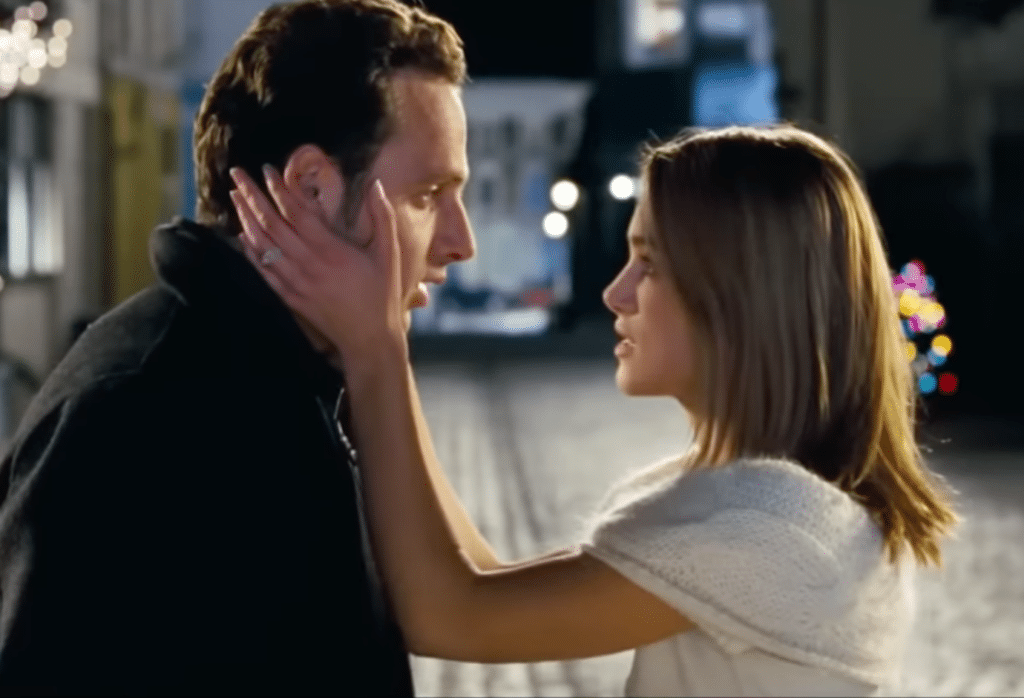It’s hard to believe twenty years have passed since the classic Christmas rom-com, Love Actually entered our lives. I was in high school when girls were dousing themselves in cheap Impulse perfume and everyone was reading a book called The Da Vinci Code.
Paris Hilton and Hillary Duff were pop culture icons.
This was the year we were introduced to Finding Nemo, Pirates of the Caribbean, and the final instalment of the Lord Of The Rings trilogy: Return Of The King.
What was popular on TV? Everybody Loves Raymond and The West Wing.
I walked around school sporting Apple’s latest iPod which featured the Touch Wheel, with earphones permanently attached to my ears, feeling like the coolest girl who ever existed.
None of those cultural touchstones seem to have lasted – they certainly no longer hold any cache in 2023. Yet Richard Curtis’ 2003 film has been a consistent presence in our lives, poking its head out around this time of the year, every year.
If you look at the graph showing the movie’s Google search trend, it spikes dramatically every December – the graph resembles a heartbeat monitor.
This year, the movie is returning to cinemas to celebrate its 20th anniversary. Let’s not beat around the bush — the distributors know this film has such a strong fanbase that people will choose to drive to the cinemas and pay $20 to watch the ensemble cast of love stories instead of consuming the movie on their lounge at home in the comfort of their pjs on Netflix.
This – despite the endless coterie of criticism the movie faces each year. If you Google “Love Actually” and then the words “problematic / criticism / bad movie” etc, you’ll get hundreds, if not thousands of op-eds slamming the film for its fat shaming, lack of diversity, misogynistic undertones (and overtones!), various takes on how much it’s dated, how it’s warped our sense of love, and so on. (And yes, this piece is definitely just piling onto the already topping numbers of annoying yet obsessive takes.)
The best criticism so far remains Lindy West’s 2013 Jezebel take, titled “I Rewatched Love Actually and Am Here to Ruin It for All of You” — where she concludes the movie’s central moral lesson as this: “The less a woman talks, the more loveable she is.”
“None of the women in this movie fucking talk. All of the men in this movie “win” a woman at the end. This goddamn movie.”
All the flak the movie has received is legitimate and correct.
And yet — every time I’m waiting for a loved one at Sydney Airport’s arrivals gate, I think of this movie. I thought about it over the weekend, standing at Gate A waiting for my 18-year old nephew after his first solo overseas trip.
Standing among a crowd of giddily anxious people, holding bouquets of flowers and hovering silver balloons with “Missed you!” and “Welcome home!” signs, it felt like one of the few remaining experiences that resemble our lives pre-smartphones. We were not glued to our phones. We were all looking at the narrow opening passageway, waiting for our special figure(s) to appear.
Which makes me think about the enduring legacy of certain movies and the silent demise of others. How do we measure the value of an artwork?
If we adjudicate its worth based on the level of cultural and social content it’s generated, then surely, Love Actually must be one of the most important films of our era.
Countless problematic rom coms were released between the 2000s – in fact, the early oughts saw the peak of the genre. This period gave us female characters who were portrayed as miserable and pathetic because they were single, (Ala Bridget Jones’s Diary (2001), My Big Fat Greek Wedding (2002)), and contained absurd premises that we were supposed to find endearing and aspirational, even — (enter Serendipity (2001), What Women Want (2000), Kate & Leopold (2001).
The entire decade gave us distressingly prickly narratives to consume (and when I say “us” I mean, women): teaching good girls to believe that there’s merit in waiting for a male arsehole you know to see you as the perfect girl for him, even though he’s proven on every front that he is perhaps the worst possible man to choose for a loving partner: Ghosts of Girlfriends Past (2009), Made of Honour (2008), EVERY SINGLE Katherine Heigl film.
That’s not even mentioning the films that actively HATE women – The Proposal (2009), Something’s Gotta Give (2003), As Good as it Gets (1997) – in fact, any rom-com starring Jack Nicholson.
Yet, few of us have rewatched any of these movies, because none of them provide the comprehensive blend of swoonworthy / sentimental / comedy (Netflix’s categorisation) of Love Actually.
None of them contain the soppy nostalgic piano music provided by Love Actually, or the heart-wrenchingly tender monologue provided by Hugh Grant in the opening of the film, where he reminds us: “General opinion’s starting to make out that we live in a world of hatred and greed – but I don’t see that. Seems to me that love is everywhere.”
At the end of every year, I hear the same sentiments thrown around casually by people around me – “This was a shit year. We need to watch something comforting.”
The thing is, I don’t recall a year since I was born that wasn’t mired by shit things happening.
Maybe we just like a film that acknowledges up front, encourages us, even, to take our minds off those things and for two hours, focus on the extremely perverse romantic entanglements of a dozen white people.


